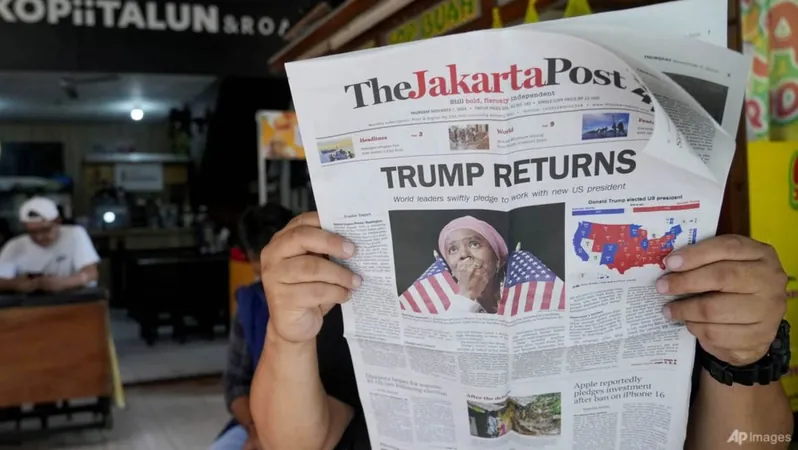
Trump's 'America First' Policy: What It Means for Global Trade in Asia
2024-11-07
Author: Sarah
Trump's Victory and Its Global Trade Impact
Donald Trump's recent victory in the United States presidential election is set to reshape not only American policies but also the dynamics of global trade, particularly in Asia. Analysts have pointed out that countries with significant trade deficits with the U.S., such as Malaysia and Vietnam, can expect the new administration to adopt a more aggressive "America First" approach compared to his initial term from 2017 to 2021.
Intensification of the 'America First' Strategy
According to Steven Okun, a senior advisor at APAC Advisors, the forthcoming "America First" strategy will be more intense. The incoming administration is likely to be staffed by individuals who prioritize U.S. self-reliance over international cooperation. This shift means nations that previously benefited from trade relations with the United States may soon find themselves in a challenging position.
Tariffs and Trade Wars
The "America First" agenda has previously included substantial tariffs on products like steel and aluminum, and it has especially targeted China, sparking one of the most significant trade wars in decades. During his campaign, Trump suggested sweeping tariffs—potentially as high as 20% on imports from all countries, with even steeper tariffs on Chinese goods.
Impact on U.S. Allies in Asia
The knock-on effects of these tariffs are anticipated to reverberate through U.S. allies in the region, including Japan, South Korea, and the Philippines. According to political scientist Chong Ja Ian from the National University of Singapore, these countries will closely monitor how U.S. tariffs against China impact their own economies. Trump's skepticism toward international organizations could further complicate trade relations, leading to greater uncertainty in the region.
Cautious Optimism and Preparedness
Alex Holmes, the Asia Pacific director for the Economist Intelligence Unit, emphasized that markets are cautiously optimistic, hoping that the totality of tariffs previously proposed may not come to fruition. Yet, given Trump's unpredictable nature, Asian countries may need to proactively prepare for potential trade disruptions.
Asian Economies on Edge
Asian economies, particularly those heavily reliant on trade, such as Singapore, Malaysia, and Vietnam, are on edge. Vietnam has previously been embroiled in controversies related to circumventing U.S. tariffs, with companies falsely labeling Chinese goods as "Made in Vietnam." Additionally, Trump’s administration labeled Vietnam a "currency manipulator" in 2020 due to allegations of currency undervaluation.
Future Scrutiny for Trade Surpluses
Looking ahead, Okun highlighted that countries with trade surpluses relative to the U.S. can expect a new regime of scrutiny and possible punitive measures. With Republicans regaining control of the Senate, there is speculation that the administration will push through policies much more swiftly than in Trump’s prior term, potentially aligning trade policies with domestic economic interests.
Influence on Security and Monetary Policies
Beyond trade, analysts also note that Trump's presidency will influence security alliances and monetary policies in Asia. Countries like Japan, South Korea, and Taiwan are particularly vulnerable from a security perspective, and there is speculation about whether new leaders in the region can cultivate relationships comparable to the rapport formed between Trump and former Japanese Prime Minister Shinzo Abe.
U.S.-China Relations and Global Protectionism
Lastly, as U.S.-China relations are poised for a new phase, the interpretation of terms like “peaceful coexistence” by Beijing will be critical. If the past is any indication, the world is now more protectionist compared to 2016, suggesting a potential rise in economic tensions.
Conclusion: Preparing for Upheaval
In conclusion, as Trump's administration moves forward with its "America First" agenda, Asian countries must brace themselves for the resulting upheaval in trade, economic stability, and international relations. The coming months will reveal how nations respond to these challenges and adapt to a changing global landscape. Stay tuned as we continue to unravel the implications of these significant shifts!




 Brasil (PT)
Brasil (PT)
 Canada (EN)
Canada (EN)
 Chile (ES)
Chile (ES)
 España (ES)
España (ES)
 France (FR)
France (FR)
 Hong Kong (EN)
Hong Kong (EN)
 Italia (IT)
Italia (IT)
 日本 (JA)
日本 (JA)
 Magyarország (HU)
Magyarország (HU)
 Norge (NO)
Norge (NO)
 Polska (PL)
Polska (PL)
 Schweiz (DE)
Schweiz (DE)
 Singapore (EN)
Singapore (EN)
 Sverige (SV)
Sverige (SV)
 Suomi (FI)
Suomi (FI)
 Türkiye (TR)
Türkiye (TR)